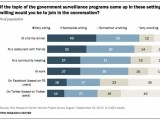Despite the fact that everyone is under the impression that social media is all about sharing whatever opinions you have on various controversial issues, it seems that there’s a level of self-censorship going on among users of both Twitter and Facebook, a trend encouraged by the networks themselves.
According to a recent study, there is a tendency of people not to speak up about policy issues In public, or even among their family, friends, and work colleagues, if they believe their own point of view it not widely shared. “This tendency is called the ‘spiral of silence’.”
The Pew Research Center questioned 1,801 adults in the United States about social issues and about one important public issue: the revelations based on Edward Snowden’s NSA files regarding the mass surveillance of American’s phone and email records.
This was the chosen topic, because the Research Center noticed in other studies that Americans were divided on whether the leaks were good or not. For instance, one survey found 44 percent of people saying the release of classified information harms the public interest, while 49 percent believe the data serves the public interest.
The new survey found that people were less willing to discuss the Snowden-NSA story in social media than they were in person. About 86 percent of Americans were willing to have an in-person conversation about the topic, but only 42 percent of them were willing to post about it on Facebook and Twitter.
Out of the 14 percent of Americans that were completely unwilling to discuss the NSA scandal in person, only 0.3 percent were willing to post about it on social media. This means that social media is no longer a refuge where people can share their opinions without fear of any getting slammed by trolls.
Both in personal and online settings, people did seem to be more willing to discuss their views if they thought the other people agreed with them, regardless if this happened at work, or with friends.
“Those who use Facebook were more willing to share their views if they thought their followers agreed with them. If a person felt that people in their Facebook network agreed with their opinion about the Snowden-NSA issue, they were about twice as likely to join a discussion on Facebook about this issue,” the study reads.
However, Facebook and Twitter users were less likely to share their opinions in face-to-face situations.
All in all, the study finds that when it comes to the Snowden case, social media did not end up providing new forums for those who otherwise choose to remain silent and to keep their opinions to themselves.

 14 DAY TRIAL //
14 DAY TRIAL // 
